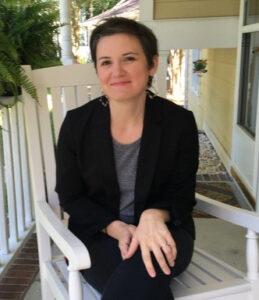One of the Scriptures I memorized growing up was Philippians 4:8: “Finally, brothers and sisters, whatever is true, whatever is noble, whatever is right, whatever is pure, whatever is lovely, whatever is admirable — if anything is excellent or praiseworthy — think about such things.”
These words held not only the weight of the word of God but were something of a household code for my family, as well as a fitting guideline for the youth group I attended where “impure” thoughts were something we were told to guard against.
These words, attributed to Paul, read like common sense advice to many. Why wouldn’t we train our minds to think lovely and good thoughts in the hope that we would only get more and more of what we’re aiming for? Unfortunately, it was the very desire to avoid dark, uncomfortable thoughts, along with ascribing too much meaning and power to them, that would create a mental health crisis for me and so many others with Obsessive Compulsive Disorder.

Rebecca Hewiitt-Newson
An individual with OCD has a mind flooded with intrusive thoughts — often violent or taboo, but always related to one’s values and/or fears. The individual becomes particularly worried about what these thoughts might mean, and they attempt to rid themselves of the anxiety caused by such disturbing thoughts by engaging in rituals aimed at relief.
Washing hands to rid oneself of the fear of germs is the one we’ve all heard of, but these rituals also could look like saying a mantra of “good” words after a curse word pops up in one’s brain or avoiding knives after one has an intrusive thought about self-harm. Because these activities never actually provide relief, someone with OCD will find themselves in a vicious cycle of obsession – compulsion – relief with windows of relief getting shorter as the windows of time engaging in compulsions increase.
The gold-standard treatment for OCD — Exposure and Response Prevention — invites people to do the opposite of what Paul seems to be teaching in Philippians. In therapy, I learned to embrace the idea that violent, disgusting and offensive thoughts can come and go and they actually mean nothing. I learned not to replace them with “better” thoughts or to perform rituals to absolve myself of the anxiety that accompanied them. The goal no longer became to avoid or rid myself of these less-than-wonderful thoughts. Instead, it became to welcome them in order to practice handling the anxiety they cause.
Learning that a thought is just a thought and nothing more was one of the most life-saving pieces of good news I’ve ever received. To realize my thoughts are not under my control, and instead that it is how I choose to act that defines me as a person, created a total shift of mindset and way of life. If repentance is a way of completely turning around, you could say it led me to repentance.
As a Christian minister, though, it is difficult to navigate the fact that there are streams of thinking and practice within my sacred texts and traditions that are counterproductive to my mental health. To be sure, the Bible holds many passages that are life-affirming and hopeful for those who live with depression, anxiety, behavior and personality disorders and a myriad of mental conditions. But the Scriptures are also full of “hard teachings” that can be applied in ways that contribute to needless suffering.
“We need to tread carefully, especially those of us who are pastors, chaplains and counselors, when we turn to the Bible for guidance to offer those living with mental illnesses.”
We must continue to embrace the biblical witness and value the mental wholeness of people. But what do we do with Jesus’ words, “If something causes you to sin, cut it off” when we encounter someone struggling with their own self-worth, who worries that everything they do is hopelessly tainted with sin? What do we do with Jesus’ statement that lust is adultery when someone has a mind flooded with sexual images all day long that they wish they could banish from their brains?
What’s clear to me is we need to tread carefully, especially those of us who are pastors, chaplains and counselors, when we turn to the Bible for guidance to offer those living with mental illnesses. We need to recognize that the very Scriptures we hold up as inspired and useful are not meant to act as a substitute for the therapies proven to help people better handle overwhelming feelings, challenging thoughts and disordered brains.
I can think of a few streams we could follow that could help us navigate the tension between the biblical witness and mental health strategies.
We could simply let the Bible be what it is instead of trying to mold it into a step-by-step answer book for every life situation. If, instead, we embrace it as a collection of works — ancient historical record, poetry, teaching, narratives — that are inspired by divine interactions, we might be less worried about the times the Bible is clearly limited by its historical context.
We also can point to the many examples in the Scriptures where God’s ways seem to change course, where Jesus seems to learn something new or where newer teachings help illuminate the old. Recognizing that the Scriptures do not present a complete argument for an immutable, transcendent God and instead that there are streams that embrace God’s will unfolding and changing within human action could help us hold biblical advice with a gentler, more creative grasp, one that invites our response and experience to be in conversation with it.
And then, finally, when the conflict between biblical teachings and life-saving therapy seems unresolvable, we can choose the preservation of life and mental well-being above all, trusting that God’s story and redeeming work is wider and more all-encompassing than we can understand. Perhaps we need to embrace that the Scriptures are made for the people, not the people for the Scriptures. This seems to me like something lovely, something true and something excellent worth considering.
Rebecca Hewitt-Newson is a Baptist minister serving at Emmaus Way, a creative and progressive community of faith rooted in Durham, N.C. She is a graduate of Wake Forest University School of Divinity, a mom of two young boys and previously served as a hospital chaplain and children’s minister. She completed treatment for OCD three years ago and is passionate about sharing what she learned in that experience with others.
Related articles:
American kids’ mental health is in crisis; the solution isn’t just therapy, it’s revolution | Opinion by Eric Minton


